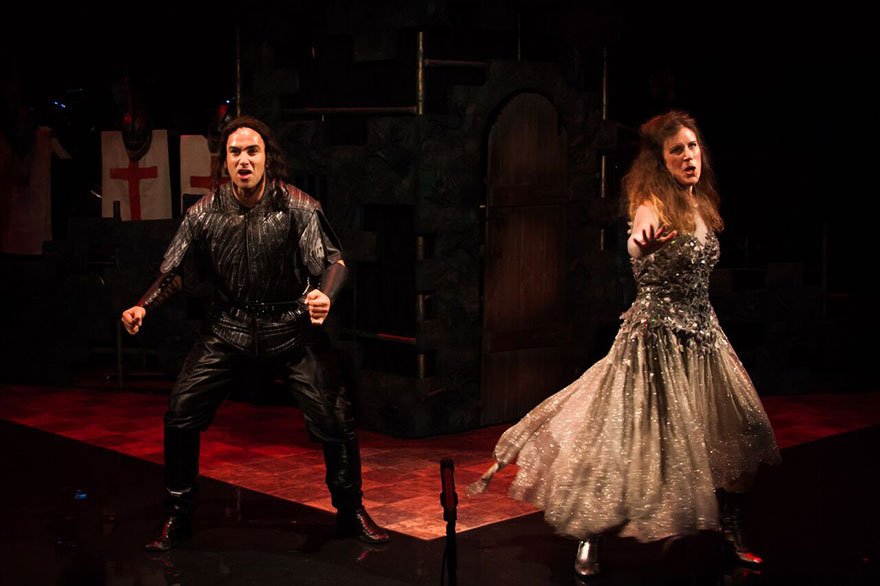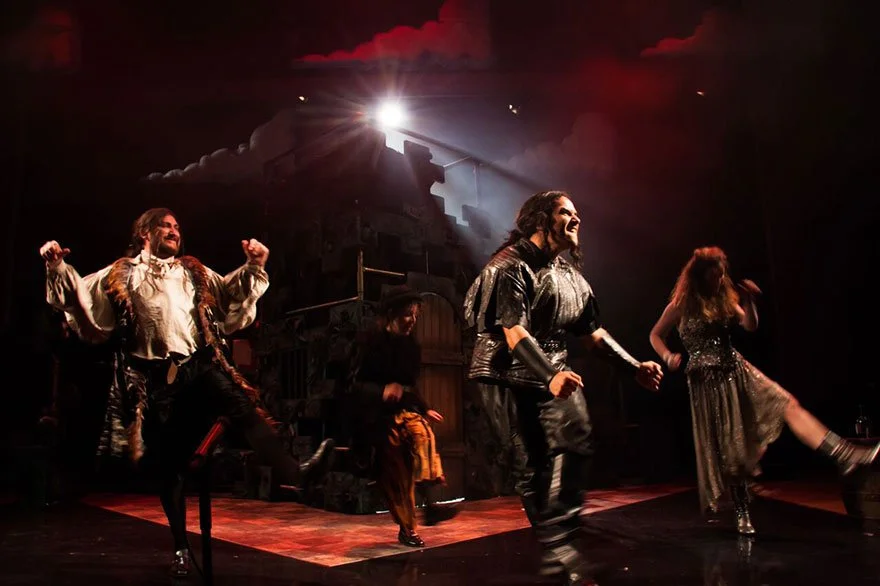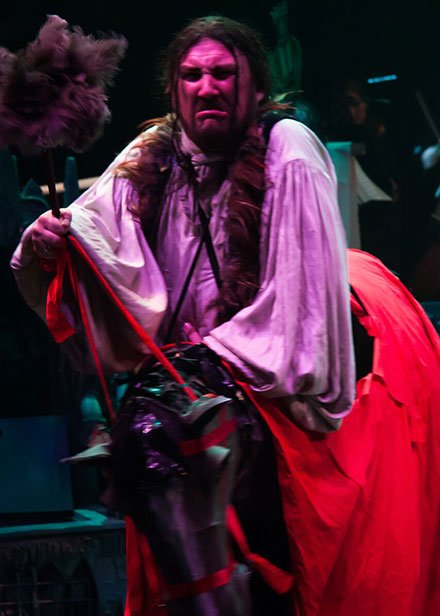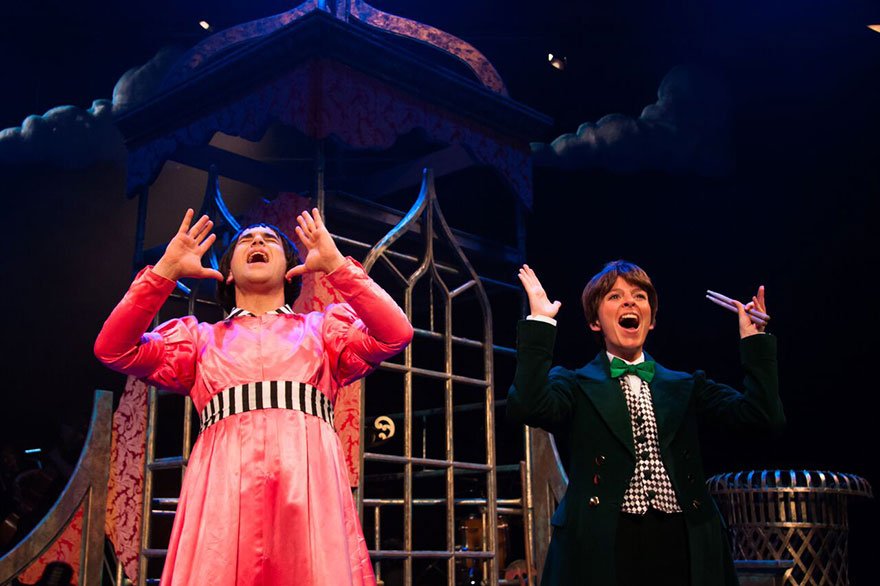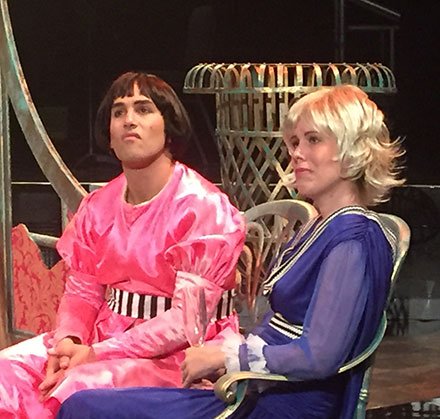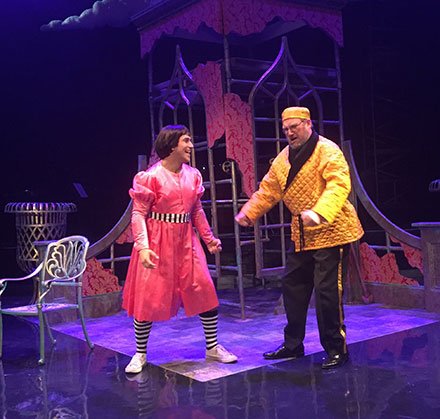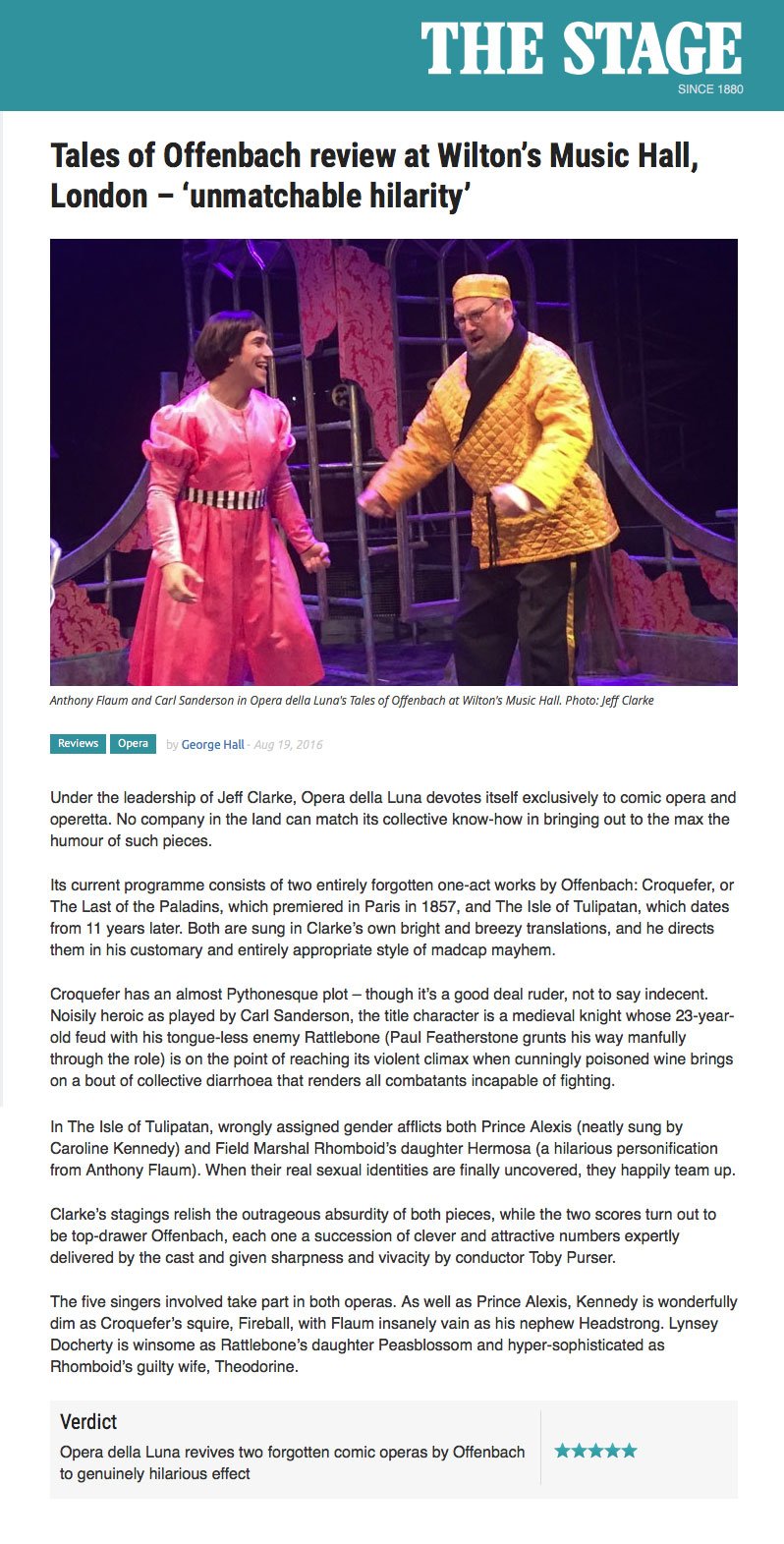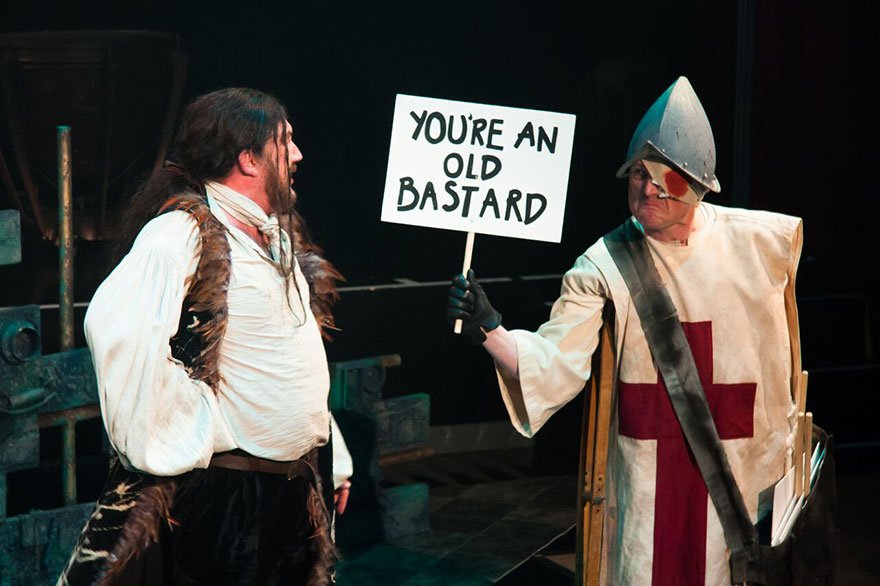
TALES OF OFFENBACH
Offenbach
OPERA DELLA LUNA
IN ASSOCIATION WITH ARTS AT STOWE AND WILTON’S MUSIC HALL
PRESENTS
Tales of Offenbach
CROQUEFER or The last of the Paladins
Libretto: Adolphe Jaime and Étienne Tréfeu
New English translation: Jeff Clarke
and
THE ISLE OF TULIPATAN
Libretto: Henri Chivot and Alfred Duru.
New English translation: Jeff Clarke
Music: JACQUES OFFENBACH
Director: Jeff Clarke
Conductor: Toby Purser
Designer: Elroy Ashmore
Orchestra of Opera della Luna
Orchestral Arrangement by Thibault Perrine
JULY 23rd & 24th 2016 Roxburgh Theatre, Stowe
AUGUST 18th & 19th 2016 Wilton’s Music Hall, London
Sponsored by the Vet Centre and made possible by a generous legacy from the late Mrs Pauline Brough
2016 Production
CROQUEFER
CAST:
Croquefer CARL SANDERSON
Fireball CAROLINE KENNEDY
Headstrong ANTHONY FLAUM
Rattlebone PAUL FEATHERSTONE
Peasblossom LYNSEY DOCHERTY
THE ISLE OF TULIPATAN
Cast:
Cacatois XXII PAUL FEATHERSTONE
Prince Alexis CAROLINE KENNEDY
Field Marshall Rhomboid CARL SANDERSON
Theodorine LYNSEY DOCHERTY
Hermosa ANTHONY FLAUM
Spring 2017 Production
CROQUEFER
CAST:
Croquefer CARL SANDERSON
Fireball CAROLINE KENNEDY
Headstrong ROBIN BAILEY
Rattlebone PAUL FEATHERSTONE
Peasblossom LYNSEY DOCHERTY
THE ISLE OF TULIPATAN
CAST:
Cacatois XXII PAUL FEATHERSTONE
Prince Alexis CAROLINE KENNEDY
Field Marshall Rhomboid CARL SANDERSON
Theodorine LYNSEY DOCHERTY
Hermosa ROBIN BAILEY
Autumn 2017 Production
CROQUEFER
CAST:
Croquefer CHARLES JOHNSTON
Fireball CAROLINE KENNEDY
Headstrong ANTHONY FLAUM
Rattlebone PAUL FEATHERSTONE
Peasblossom LYNSEY DOCHERTY
THE ISLE OF TULIPATAN
CAST:
Cacatois XXII CHARLES JOHNSTON
Prince Alexis CAROLINE KENNEDY
Field Marshall Rhomboid PAUL FEATHERSTONE
Theodorine LYNSEY DOCHERTY
Hermosa ANTHONY FLAUM
CROQUEFER
or The Last of the Paladins
Scene: The ruins of Croquefer’s castle, somewhere in the south of France, sometime during the last crusades.
First performance: Theatre des Bouffes-Parisiens, Paris February 12, 1857.
Synopsis:
From the top of his ruined tower, Croquefer and his equerry Fireball survey the countryside for any sign of his arch enemy, Rattlebone. They have been engaged in a bitter war for 23 years, but now Croquefer has only one weapon left: his beloved sword of Toledo. In his eagerness to remain concealed, he slips and swallows the sword. Rattlebone is spotted in the distance advancing towards the castle with six armed men, presumably to rescue his daughter Peasblossom whom Croquefer abducted fifteen days previously and who is languishing in a filthy cell. Fireball tries to come up with various cunning plans to thwart them, but Croquefer is ready to surrender.
Rattlebone arrives, and using signs to communicate (his tongue is one of the many body parts he has lost), defies him. They resolve to fight to the death. Croquefer’s nephew, Headstrong, suddenly arrives and offers to join his uncle in the fight. Together with Fireball, the three sing a spirited trio and renew their campaign. Croquefer leaves and instructs Headstrong to keep guard on the daughter of Rattlebone. He invites him to drink from his concealed “cellar” in his favourite armchair.
From her prison cell, Peasblossom calls to Headstrong and succeeds in re-awakening a long dead love between them. She persuades him to desert his uncle and escape with her to Paris. They sing of the delights awaiting them at the Opera (quoting from well-known operas of the time). They conclude by imagining the delights of dancing the spirited Galop du Postillon (Postman’s Hop), an energetic dance comparable to the Cancan. Fireball, and then Croquefer are both tempted to join the dance.
When Rattlebone returns, Croquefer presents him with two options: either Peasblossom will marry him or she will be killed. Independently and unknown to each other, Fireball and Peasblossom have conceived a plot to serve poisoned wine to their adversaries. Croquefer proposes a toast and sings a drinking song, as they all drink to each other’s success.
Croquefer and Rattlebone mount their horses and prepare to fight. Just as they commence battle the effects of the poisoned wine begin to take effect, and combat is halted by the onset of an unforeseen bout of collective diarrhoea. Such is the violence of this affliction, that Croquefer's sword and Rattlebone’s tongue are returned to their respective owners. Rattlebone regains the power of speech but this recovery brings momentous unforeseen consequences. They all resolve to settle their differences and put an end to fighting.
THE ISLE OF TULIPATAN
Scene : The terrace of Romboid’s villa, on the Island of Tulipatan, 15,000 miles for Nanterre.
Time: 473 years before the invention of hygienic spittoons.
First performance: Theatre des Bouffes-Parisiens, Paris September 30, 1868.
Synopsis:
Field Marshall Octavious Rhomboid is the Lord High Steward, of the supreme ruler of Tulipatan - Cacatois XXII.
Rhomboid blames his wife Theodorine for their daughter Hermosa’s unconventional and wild behaviour. Hermosa appears firing guns, and her father reproaches her for her neglect of needlework and the piano, but his wife defends the spirited girl. Rhomboid compares her unfavourably to the gentle and gracious Prince Alexis, son of Cacatois. Hermosa finds him very charming and very pretty.
Cacatois arrives to pay a visit to Rhomboid, accompanied by Alexis. The Prince is distraught, grieving for the loss of his pet canary. Cacatois is not impressed by his son’s unmanly behaviour. As soon as they are left alone Hermosa and Alexis reveal their affection for each other and Hermosa instructs the boy in how to declare his love. They are surprised by the return of Rhomboid and his wife, who are both horrified by the prospect of this liaison but Alexis demands that Rhomboid go with him to Cacatois to ask his consent.
Theodorine now confesses to her daughter that she is in fact a boy. An interminable war at the time of the birth made her mother fearful that her child would have to do military service and in a moment of weakness she registered Hermosa as a girl. She worries how she is going to break the news to her husband whom she has fooled for 18 years.
Rhomboid returns, sends his wife on an errand, then tells his daughter that the duke Cacatois was so determined to have a male heir after three daughters that the late Duchess and he, resolved to telegraph the Duke, who was away at war, that he now had a son. For 18 years Cacatois has believed he had a son and heir. He is surprised how well Hermosa takes the news, and is amazed to see her dancing. He is even more astonished when Alexis, who has over-heard some of this conversation, appears in a dress.
Hermosa now returns as a dashing guards officer and the two young people rejoice in their new found identities.
After lunch, Cacatois reveals that he always sings and dances a Barcarolle to help his digestion. He insists that Rhomboid and Theodorine join him, before demanding that they give their consent for their daughter to wed his son Alexis. When the young couple appear, the older generation are thrown into some confusion, which is not quickly explained. Eventually the Duke resolves to let them be, and comes up with a new plan to ensure the future of the Cacatois Dynasty.
